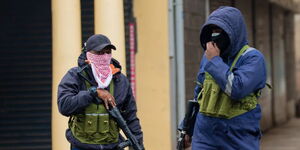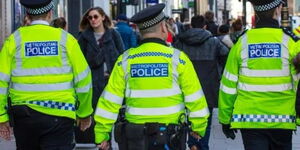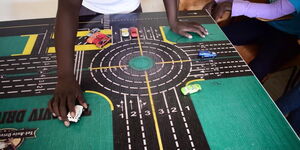Amid the ongoing concerns over the safety and operational strategies of Kenyan officers operating under the Multinational Security Support (MSS) mission to Haiti, a Kenyan police officer has opened up to the media on what it is like operating in the gang-infested towns of the Caribbean country.
The officer, identified as Inspector Mwangi, opened up to the British broadcaster Sky News on how Kenyan officers have intensified their pursuit of the Haitian gangs, who have since resorted to bases outside town.
According to Mwangi, the Kenyan officers patrol the streets during the day, visiting the mountainous hideouts of the gangs to identify, among other elements, spotters who the gangs use to survey their enemies, the Haitian police and others under the MSS mission.
However, the officer revealed that night patrols remain their biggest challenge, as gangs often lay ambushes and subject them to heavy artillery rounds, making the US-supplied Mine-Resistant Ambush Protected (MRAP) vehicles their only lifeline in such ambushes.
However, in the event of an ambush, officers are often forced to switch off all vehicle lights to better spot enemy positions.
Unfortunately, night operations remain limited, as engagement is only possible from the rooftop of the MRAPs—exposing the officer manning the artillery turret to heightened risk and making them an easy target.
Under such heavy exchanges, the officer maintained that they, however, have to be strategic with the gangs, as they only engage them if they act.
"We want to see if they engage us in exchange again; if they don't, we move on," Inspector Mwangi, a Kenyan police officer, narrated.
"The MRAP is safe, but it only has the roof position to engage from, so it's a bit restrictive," he added.
To the Kenyan officers, urban warfare is considered one of the most dangerous, and the mission teams face that ever-present danger every day as they have to consider the safety of the citizens and their own as well.
Meanwhile, following reports that the US was reconsidering its aid to the MSS mission due to delays in progress against gang combat in Haiti, Kenyan police leadership has urged Washington to maintain its support, proposing targeted assistance to help them advance and complete the mission.
MSS mission lead Commander Godfrey Otunge has appealed to the US government to consider short-term strategies in eliminating the gangs by considering adding more resources, personnel and equipment to enable them to complete the mission in the next three to six months.
"It's very clear from the commitment and the agreement that we need to look into the quick wins within the short term, rather than thinking about long-term things," Otunge told Sky News in an interview.
"With the equipment and with the personnel that we are going to get, at least within three to six months, we'll be talking of a new Haiti, and that is where we are focused on."
The comments by Otunge come after it emerged that in return for more aid, Washington demands quick results, among them, that would enable the Caribbean nation to build a strong path to lasting security.












